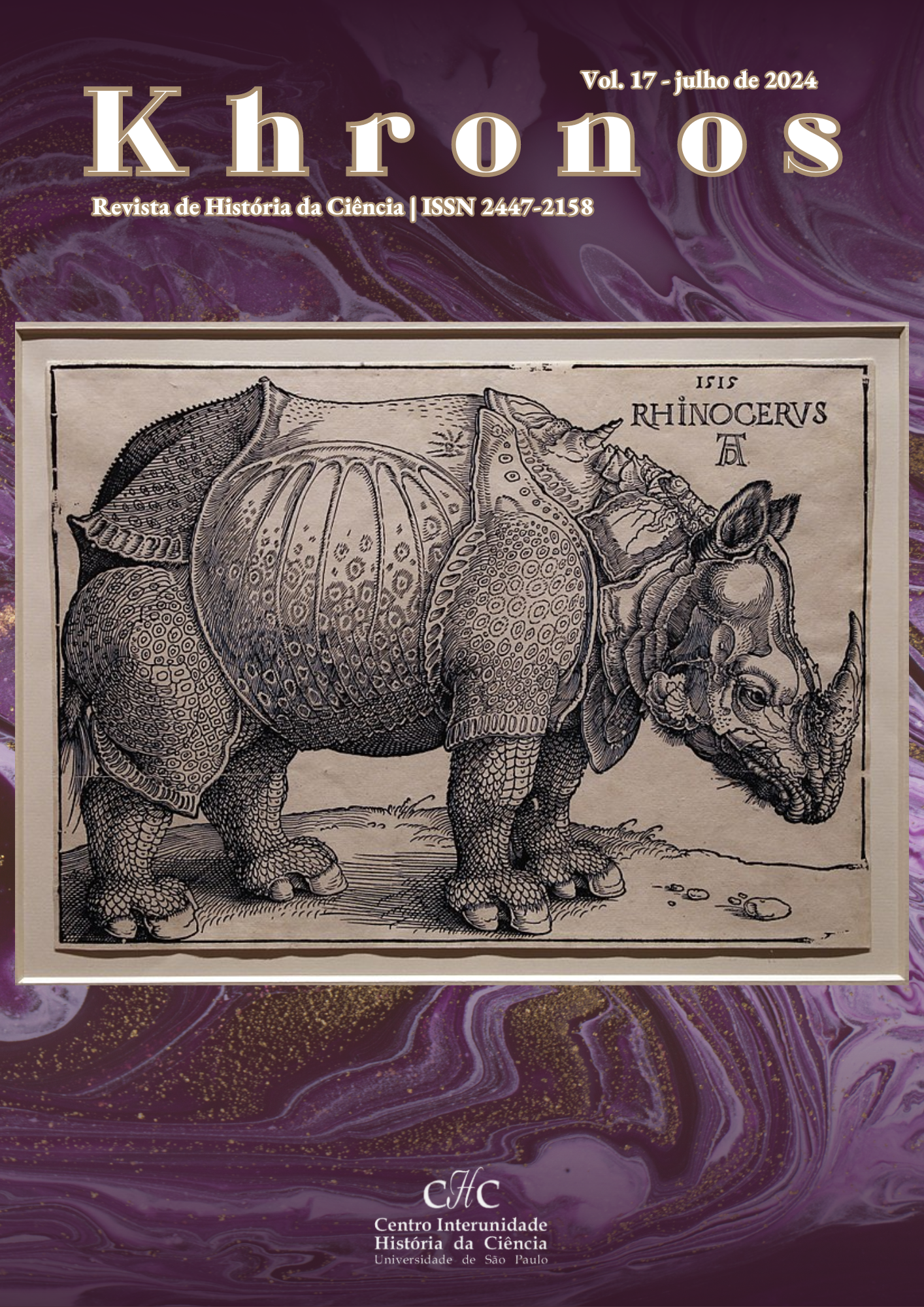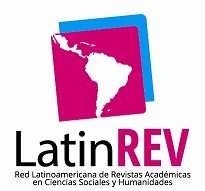Duhem's conception of the history of science as intellectual history - historiographical theses and the methodology of continuityand convergence
DOI:
https://doi.org/10.11606/issn.2447-2158.i17p71-100Keywords:
formal history, intellectual history, continuism, teleology, structural realismAbstract
The objective of this article is to present Duhem's conception of the history of science as intellectual history and defend the thesis that it is a continuistic and tel-eological conception with the function of providing the conception of science with a dynamic that guarantees the value of knowledge. In a subsidiary way, a second conception of history will be introduced: formal, more restrictive as it is the exclu-sive result of the logic and empirical basis of science, and will show that it is in this scenario that the history of science presents itself, firstly, as continuous and teleo-logical. This article is the development of another published elsewhere. We now argue that each of the conceptions of history, formal and intellectual, has its own natures and functions that reveal different resources from the methodological parts of the conception of the theory of science.
Downloads
References
AGASSI, joseph. Towards a historiography of science. New York: Wesleyan University Press, 1967.
AGASSI, Joseph. Continuity and Discontinuity in the History of Science. Journal of the History of Ideas, 34, 1973, pp. 609-626.
ALTHUSSER, Louis. Ler o Capital. Rio de Janeiro: Zahar, 1979.
ALTHUSSER, Louis. Para un materialismo aleatório. Madrid: Arena Libros, 1986.
ARNOLD, Vladimir. Mathematical method of classical mechanics. New York: Springer-Verlag, 1980.
BACHELARD, Gaston. O novo espírito científico. São Paulo: Abril Cultural, 1978.
BACHELARD, Gaston. A formação do espírito científico. Rio de Janeiro: Contrapon-to, 1999.
CANGUILHEM, George. Étude d’histoire et de Philosophie des Sciences. Paris: Vrin, 1968.
CHIAPPIN, José Raymundo Novaes. Duhem’s theory of science: an interplay between philosophy and history of science. Ph.D. thesis, Philosophy, Faculty of arts and sciences, University of Pittsburgh, 1989.
CHIAPPIN, José Raymundo Novaes; LEISTER, Carolina. A filosofia da história de Duhem: natureza e função. Revista de História, [S. l.], n. 161, p. 245-273, 2009. DOI: 10.11606/issn.2316-9141.v0i161p245-273. Disponível em: https://www.revistas.usp.br/revhistoria/article/view/19125. Acesso em: 29 nov. 2023.
CHIAPPIN, José Raymundo Novaes; LEISTER, Carolina. Duhem como precur-sos de Popper, Kuhn e Lakatos sobre a metodologia da escolha racional de teorias: da dualidade à trialidade metodológica. Veritas (Porto Alegre), 60(2), pp. 313–343. https://doi.org/10.15448/1984-6746.2015.2.13975. Acesso em: 29 nov. 2023.
COMTE, Auguste. A general view of positivism. Translated by J.H. Bridges. London: Routledge, 2015 [1844].
DUHEM, Pierre. Quelques réflexions au sujet des théories physiques. Revue des Questions Scientifiques, 31, 1892, pp. 139-177.
DUHEM, Pierre. Physique et Métaphysique. Revue des Questions Scientifiques, 34, 1893a, pp. 55-83.
DUHEM, Pierre. Introduction à la mécanique chimique, Paris: Georges Carré, 1893b.
DUHEM, Pierre. Les Théories de l’optique. Revue des Deux Mondes CXXIII, 1894, pp. 94-125.
DUHEM, Pierre. Fragments d’un cours d’optique – Deusième fragment: coup d’oeil sur l’optique acienne. L’optique de Young. Annales de la Sociète Scientifique de Bruxelles, XIX, 1895a, pp. 27-94.
DUHEM, Pierre. Les Théories de la Chaleur-II. Les créateurs de la Thermodyna-mique. Revue des Deux Mondes, CXXX, 1895b, pp. 380-415.
DUHEM, Pierre. L’évolution des Théories Physiques du XVII siècle jusqu’à nos jours. Revue des Questions Scientifiques, 40, 1896, pp. 463-499.
DUHEM, Pierre. Termochimie, à propos d’un livre récent de M. Marcelin Berthelot. Paris: A. Hermann, 1897.
DUHEM, Pierre. Analyse de l’ouvrage de Ernst Mach: la mécanique, étude histo-rique critique de son développement. Bulletin des Sciences Mathématiques, XXVII, 1903, pp. 261-283.
DUHEM, Pierre. Les origines de la statique, v. 1. Paris: A. Hermann, 1905.
DUHEM, Pierre. Les origines de la statique, v. 2. Paris: A. Hermann, 1906a.
DUHEM, Pierre. Études sur Léonard de Vince: Ceus qu’il a lus et ceus qui l’ont lu, v. 1. Paris: A Hermann, 1906b.
DUHEM, Pierre. Traite d’Énergétique ou thermodynamique générale. Paris: Gauthier-Villars, 1911.
DUHEM, Pierre. La Science Allemande. Paris: A. Hermann, 1915.
DUHEM, Pierre. Notice sur les titres et travaux scientifiques de Pierre Duhem. Paris: Gauthier-Villars, 1917.
DUHEM, Pierre. Le Système du Monde. Paris: A. Hermann, 1954-1959.
DUHEM, Pierre. The Aim and Structure of Physical Theory. New York: Atheneum Press, 1974.
DUHEM, Pierre. Evolution of Mechanics. The Netherlands: Sijthoff & Noordhoff, 1980.
DUHEM, Pierre. To Save the Phenomena. Chicago: University of Chicago, 1985.
FUKUYAMA, Francis. The end of history and the last man. New York: The Free Press, 1992.
GIEDYMIN, Jerzy. Science and convention: essays on Henri Poincaré’s philosophy of science and the convencionalist tradition. New York: Pergamon Press, 1982.
HEGEL, Georg Wilheim Friedrich. The philosophy of history. New York: Dover Pub-lications, 1956.
HUME, David. Investigações sobre o entendimento humano e sobre os princípios da moral. Tradução José Oscar de Almeida Marques. São Paulo: Editora Unesp, 2004.
KANT, Immanuel. Critique of pure reason. Cambridge: Cambridge University Press, 1998.
KUHN, Thomas S. A Estrutura das Revoluções Científicas. São Paulo: Perspectiva, 1978.
LAKATOS, Imre. História da Ciência e suas Reconstruções Racionais. Lisboa, Edições 70, 1998.
LAUDAN, Laurens. Progress and its Problems. Berkeley, University of California Press, 1977.
MACH, Ernst. Popular scientific lectures. Chicago: The Open Court Publishing Co., 1898.
MACH, Ernst. History and root of the principle of the conservation of energy. Chicago: The Open Court Publishing Co., 1911.
MACH, Ernst. The science of mechanics. Chicago, The Open Court Publishing Co., 1919.
MANGOLIN, Cesar. Althusser e o materialismo do encontro: continuidade, com-plementaridade ou ruptura? Crítica marxista, 46, 2018, pp. 17-25. Disponível em https://www.ifch.unicamp.br/criticamarxista/sumario.php?id_revista=62&numero_revista=46. Acesso em: 01 dez. 2023.
MARTIN, Niall. The Genesis of a Mediaeval Historian: Pierre Duhem and the Origins of Statics. Annals of Science, 33, 1936, pp. 119-129.
MARTIN, Niall. The Philosophy of Physics According to Pierre Duhem. Ph.D. thesis, London School of Economics, 1981.
MARTIN, Niall. Darwin and Duhem. History of Science, 20, 1982, pp. 64-74.
MEYERSON, Emile. Identity and Reality. New York: The Macmillan Co., 1930.
Paul, Harry W. Pierre Duhem: Science and the Historian’s Craft. Journal of the Histo-ry of Ideas, 33, 1972, pp. 497-513.
POPPER, Karl. A lógica da pesquisa científica. São Paulo: Editora Cultrix, 2012.
Downloads
Published
Issue
Section
License
Copyright (c) 2024 José Raymundo Novaes Chiappin, Jojomar Lucena da Silva

This work is licensed under a Creative Commons Attribution-NonCommercial 4.0 International License.
Authors who publish in this journal agree to the following terms:
- Authors retain the copyright and grant the journal the right to first publication, with the work simultaneously licensed under the Creative Commons Attribution License in the "Attribution-NonCommercial 4.0 International" (CC BY-NC 4.0) modality that allows sharing of the work with acknowledgment of authorship and initial publication in this magazine.
- Authors are authorized to assume additional contracts separately, for non-exclusive distribution of the version of the work published in this journal (eg, publishing in institutional repository or as a book chapter), with acknowledgment of authorship and initial publication in this journal.
- Authors are allowed and encouraged to publish and distribute their work online (eg in institutional repositories or on their personal page) at any point before or during the editorial process, as this can generate productive changes, as well as increase impact and citation of the published work (See The Effect of Open Access).
- Any doubts or complaints about copyright must be directed to the Editorial Board or qualify and express themselves in accordance with the guidelines of the Committee on Publications Ethics (COPE).





